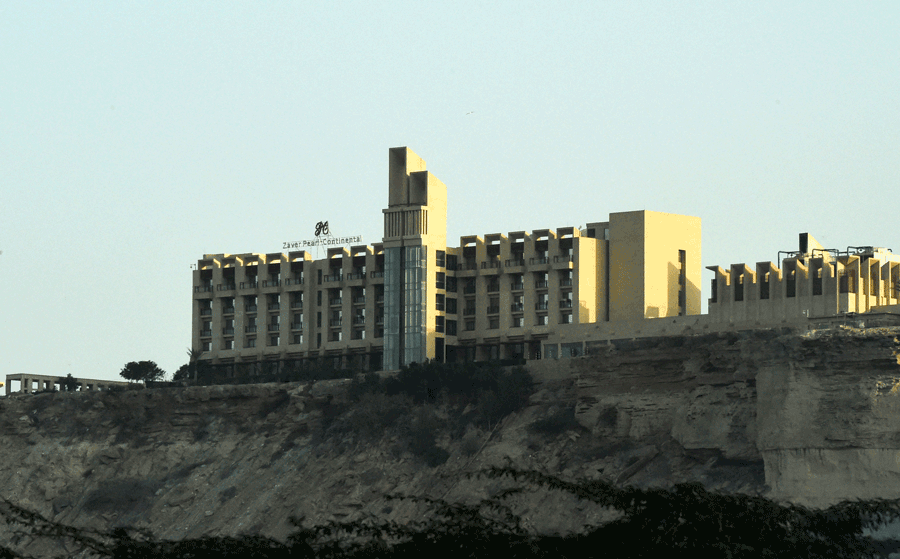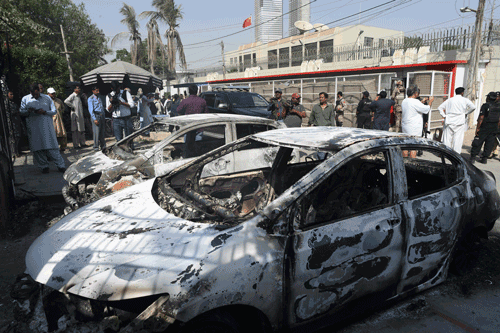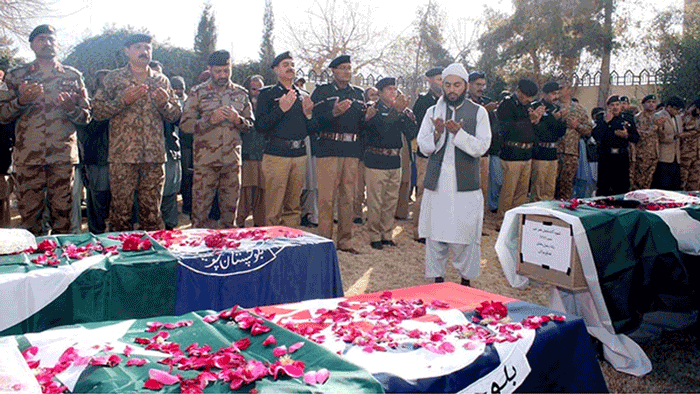Warning Signals
By Adnan Aamir | Newsbeat National | Published 6 years ago
On May 11, three militants stormed Pearl Continental (PC) Hotel in Gwadar, after passing three layers of security checkposts. The PC is located on a hilltop called Koh-e-Batil, which presents a panoramic view of Gwadar, including the Chinese-built and operated port. The gunmen killed three security guards at the PC and took control of a major portion of the hotel. This was followed by a 24-hour battle with the security forces, to clear the building.

During the attack itself, there was a great deal of uncertainty about what was going on inside the hotel building. Cellular communications in Gwadar were jammed and news channels blacked out all coverage of the event. However, social media was abuzz with rumours of what was happening inside the hotel. One of the commonly shared rumours was that 40 Chinese officials had been taken hostage by the militants. As the battle inside the PC continued, rockets were being fired from the hotel onto Gwadar port, according to local sources, and there was panic everywhere.
After almost 24 hours, security officials announced that the hotel had been cleared. The operation ended with the death of all three attackers, one security officer and four members of the hotel staff. According to official claims, no foreigner was hurt in the attack and rumours of Chinese officials being trapped inside the building were rejected by the government.
When Gwadar port was being developed during General (R) Pervez Musharraf’s presidency, there was not a single quality hotel to lodge guests. The PC was built in Gwadar in 2007 and, has since been the destination of choice for almost all guests and dignitaries visiting the port city. They include officials from both China and Pakistan, real estate investors and the occasional high-end tourists. In fact, the PC had become a symbol of foreign investment in Gwadar.

Pakistani security personnel stand next to burnt vehicles in front of the Chinese Consulate in Karachi after an attack on November 23, 2018.
In April 2016, I attended a conference in Gwadar, titled ‘Peace and Prosperity in Balochistan.’ The conference was held in the PC, under the complete security cover of the army. Moderate in size, with only about a hundred rooms, the hotel could not accommodate many of the participants at the conference. That event made it amply clear that the PC alone was not enough to cater to the growing needs of Gwadar. Consequently, in 2018, the Chinese built their own business centre near the port which reduced their dependence on the PC. This would explain why there were not many Chinese in the hotel at the time of the attack.
The Majeed Brigade, an offshoot of the Baloch Liberation Army (BLA), claimed responsibility for the attack. The BLA released pictures of the attackers and, later, a pre-recorded video on social media, in which the attackers demand that Chinese nationals leave Balochistan or else face the group’s wrath through repeated attacks. The BLA claims to have inflicted heavy losses on the Chinese officials staying in the hotel.
Sources on the ground, however, rubbish the BLA’s claim. Bahram Baloch, a local journalist in Gwadar, maintains that there were very few guests staying in the hotel at the time of the attack. “Due to the Ormara incident in April, the number of guests arriving in Gwadar had significantly reduced,” he told Newsline. He added that since it was the month of Ramazan, there were fewer hotel guests than usual, and this prevented a greater number of casualties.
This attack was a continuation of a series of attacks launched by the BLA against Chinese interests in Balochistan. In August, the BLA targeted a bus carrying Chinese engineers to Dalbandin through a suicide attack. In November, the Chinese consulate in Karachi was stormed by BLA militants.
The attack on the PC was aimed at targeting the symbol of foreign investment in Gwadar. The BLA failed to achieve its target of inflicting loss on the Chinese, but it delivered a strong message by targeting what was believed to be the most secure spot for investors in Gwadar.
James M. Dorsey, a senior fellow at the S. Rajaratnam School of International Studies Singapore, believes that the attack on the PC came at a critical time. “This attack came against the backdrop of Pakistan blaming Iran for harbouring Baloch insurgents, and [it] will further escalate tensions between the countries,” he said. Dorsey added that Pakistan’s government is trying to attract greater investment and the attack by the BLA would affect the investment climate in Pakistan. “CPEC is the crown jewel of the BRI project of China and the attack on the PC in Gwadar was aimed at the heart of CPEC,” he added.

Funeral prayers were held for the martyred staff and security guard.
A few days after the attack, the BLA released another video message. It demanded that Chinese President Xi Jinping withdraw all Chinese personnel from Balochistan, otherwise they would be targeted again. This has further complicated matters for CPEC in Balochistan. The movement of Chinese nationals has been reduced amid growing security concerns. This could result in slowing down progress on CPEC-related development projects and consequently, the CPEC development mantra in Balochistan will take a huge blow.
The critical question is, how will the government of Pakistan react to this development? “Pakistan has never hesitated to crack down hard against the BLA and its supporters, and this time won’t be any different,” says Michael Kugelman, the Wilson Centre’s Deputy Director for South Asia. He claims that the Gwadar attack was significant in the context of the entire dynamic of China’s Belt and Road Initiative. “The targeting of the [PC Hotel] represents a major blow to Pakistanis and their critical Chinese ally,” he said.
Clearly, the government of Pakistan will respond by increasing security in Gwadar, which will result in increased militarisation of the port city. This will not only increase defence spending in the federal budget, but it will also send all the wrong signals to foreign investors and create the impression that Gwadar is not safe for travel, let alone investment.
The government of Pakistan must come up with a political solution to resolve the conflict in Balochistan. This will not be easy, but it is the only option. Once a political settlement is reached with the insurgents, the government will be able to control foreign interference in the conflict. Historically, military action has never succeeded in resolving conflicts in the province.


